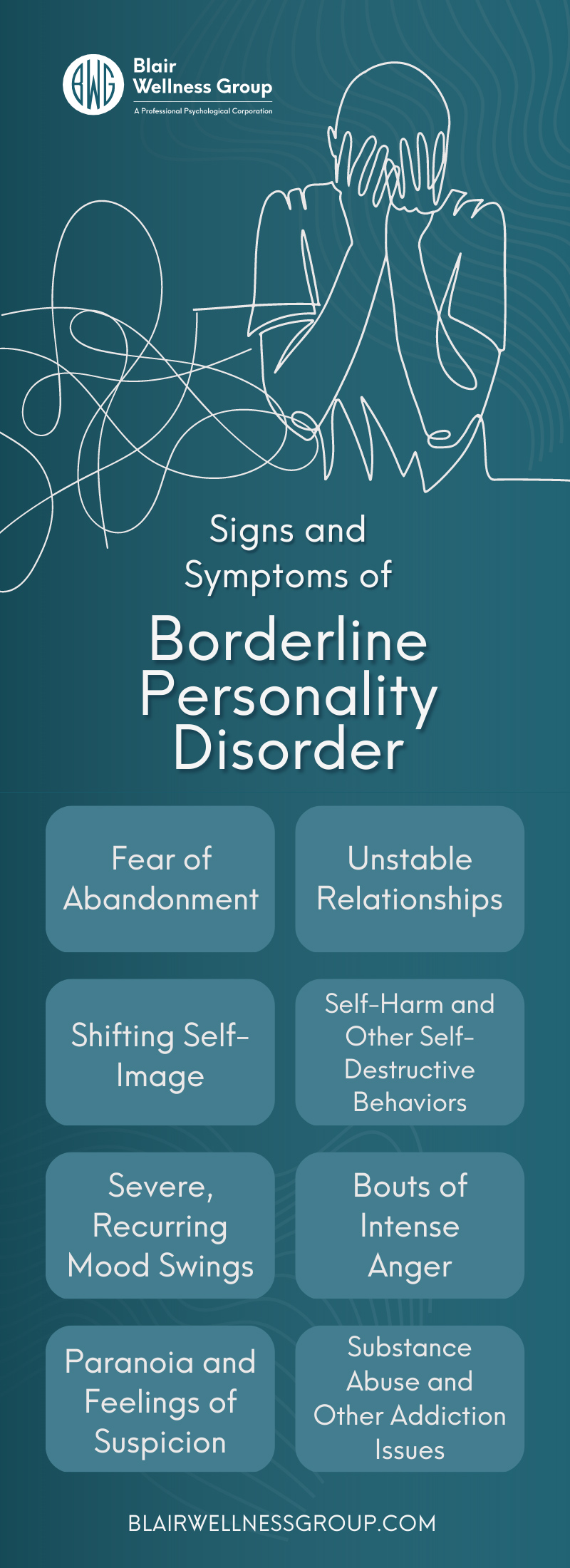Borderline Personality Disorder (BPD) is a complex Mental Health Condition that affects an individual’s sense of self, emotions, behavior, and relationships with others. People diagnosed with BPD often experience intense episodes of depression, anxiety, panic attacks, anger, rage, resentment, hopelessness, mood swings, paranoia, and other mental health symptoms. Learning more about where these symptoms come from and how they adversely affect your life makes it easier to recognize the signs of BPD in yourself .
By understanding the signs and symptoms of Borderline Personality Disorder, you can gain a clearer perspective of your situation and find the professional help you need to overcome this personality disorder.
Unstable and Volatile Relationships
Relationships can be difficult and highly unstable for those suffering from Borderline Personality Disorder. Symptoms like extreme mood swings, an unstable self-image, and feelings of mistrust or paranoia can lead to erratic behaviors that are difficult for others to understand, predict, anticipate, trust, or respect. Moreover, these inconsistencies in behaviors and language can cause significant emotional distress and result in strained and volatile relationships, particularly with family members, friends, colleagues, associates, and romantic partners who find themselves unable to cope with the shifting behaviors or mood swings.
It’s also common for people diagnosed with Borderline Personality Disorder to have trouble with impulse control, making them more prone to risky behaviors such as impulsively sabotaging personal or professional success, suddenly quitting a positive relationship, or giving up on a fulfilling opportunity. Individuals suffering from BPD experience frequent emotional outbursts, passive-aggressive tantrums, vindictiveness, and conflict escalation due to inability to regulate their emotions, high levels of impulsivity, lack of metallization or social causality, and low frustration tolerance, which makes them unreliable, reckless and untrustworthy to others. As a result, people suffering from BPD have difficulty with achieving meaningful relationships or maintaining fulfilling lifestyles which leads to intense depression, sadness, loneliness, feelings of despair, chronic emptiness, anxiety disorders, panic attacks, divorce, rocky relationships, job dissatisfaction, addiction issues, insomnia, other co-morbid mental health illnesses, and medical problems in later life. Additionally, individuals with BPD might struggle with pervasive trust issues, which can significantly impair personal or professional relationships, as individuals with BPD have difficulty with building, cultivating, maintaining, and sustaining meaningful connections or establish reliable bonds with others.
The instability of the signs and symptoms associated with BPD often leads to highly strained relationships within families, significant others, professional relationships, and friendships. Those affected are constantly in flux; their impulsivity and erratic actions may be confusing and difficult for others to comprehend or find acceptable. As a result, maintaining reliable connections and fulfilling relationships with these individuals can be an uphill battle for both the person directly struggling with Borderline Personality Disorder or those trying to help them in treatment and recovery.
Shifting Self-Image
People with Borderline Personality Disorder often experience an unstable sense of self and a shifting self-image that can manifest as arrogance, entitlement, narcissism, and anger in one moment and appear as having low self-esteem, sadness, or anxiety the next. This inconsistency in mood and volatility in behavior can lead to chronic difficulties in both personal and professional relationships, frequent job changes, high rates of divorce or affairs, toxic breakups, severe addiction issues, self-destructive behaviors, medical problems, family feuds, and identity crises.
A lack of secure attachment in childhood with primary caretakers leads to experiencing profound difficulty in forming intimate and fulfilling relationships in adulthood for those suffering from Borderline Personality Disorder. The common features of BPD may include feelings of fear, loneliness, anxiety, chaotic relationships, addictions, eating disorders, unreliability, and mistrustful behavior. Those affected by the disorder may yearn for acceptance or attention from others but find it difficult to develop or sustain connections due to insecurity about their own self-image and self-worth. The lack of a stable self-image, as a result of inconsistent parenting style in their childhood, is a key component of developing Borderline Personality Disorder. The pattern of insecure attachment in childhood predisposes the person to personality disorders, specifically BPD, and causes them to yearn for chaos, conflict, and particularly negative attention, as it allows these individuals to numb, escape, detach from their painful reality, and numb the feelings of chronic emptiness, void, or loneliness.
The constant fluctuations in job performance, strained relationships, shifting goals, lack of a higher value system, and other fundamental challenges create feelings of emotional instability, unpredictable choices, chronic mood swings, and an array of addiction issues. They might feel like they’re not in control or that they barely exist at all unless they create chaos or wreck havoc in their personal or professional life. These host of intense emotions, chronic mood swings, unpredictability in behavior or language, and impulsivity can lead to significant anxiety, depression, loneliness, life dissatisfaction, and other co-morbid conditions, such as addictions and other personality disorders, that exacerbate negative self-image issues and other symptoms of BPD.
Fear of Abandonment
Fear of abandonment is a hallmark trait of those living with Borderline Personality Disorder. Individuals with BPD experience intense feelings of fear or anxiety about losing their family members, friends, and intimate partners, losing a job, or fear of getting rejected by others. These intense feelings of paranoia, inability to trust others, and intense fears can stem from seemingly small events, such as someone being late for an appointment or not texting them back right away. Even though the cause may be insignificant, the emotional reaction can be intense, paralyzing, and debilitating.
When left unchecked, this fear leads to problematic and maladaptive coping mechanisms. Individuals suffering from BPD might initially become clingy or co-dependent particularly in relationships with others, but vacillate between clinginess or sudden withdrawal which often leads to terminating long-term relationships, divorce, marital affairs, and other maladaptive behaviors. Alternatively, some individuals grow possessive, become extremely controlling, dominating, and highly manipulative because of their insecurities, volatility, unregulated emotional state, and unmodulated anxieties. These paralyzing feelings and patterns of maladaptive behaviors end up pushing others further away, thus worsening the cycle of abandonment. This is an example of self-fulfilling prophecy by creating situations in one’s personal and professional life that validates the internal belief system and working model of the person struggling with BPD in creating predicaments that leads to their abandonment by others. However, understanding triggers and engaging in evidence-based treatment models with the help of a Licensed Clinical Psychologist can empower individuals on their journey toward full recovery and treatment of Borderline Personality Disorder.
Self-Harm and Other Self-Destructive Behaviors
Another common symptom of BPD involves self-destructive behaviors associated with sensation-seeking, negative attention-seeking, compulsive care-seeking, and high levels of impulsivity, such as reckless driving, shoplifting, risky sexual behaviors, taking lavish trips, illicit drugs, alcohol abuse, porn, shopping sprees, spending large amounts of money on material possessions, luxury items, or gambling without much thought for the negative consequences. It is important to recognize that these negative behaviors are entrenched in BPD and not just typical phases of development. Additionally, these kinds of behaviors may become more extreme over time and can lead to acts of deliberate self-harm, suicidal thoughts, other impulsive behaviors, personal or professional conflicts, host of addictions, and passive-aggressive anger outbursts.
Severe, Recurring Mood Swings
Individuals with BPD often experience recurring mood swings that vary in severity and duration. This pattern of highly volatile and unpredictable emotions can range from extreme elation, grandiosity, and cockiness to profound sadness, rage, anger, resentment, depression, anxiety, and vindictiveness within moments. These intense feelings can be quite debilitating to an individual living with BPD and those in personal or professional relationships with them.
That said, mood swings can still last for hours or even days, leaving the person struggling with BPD feeling drained, upset, angry, anxious, or lethargic. Mood swings can also further complicate other areas of personal and professional life, intensify fears or paranoias, and increase anxieties that stem from Borderline Personality Disorder.
Bouts of Intense Anger
The frequently shifting emotional state of individuals with BPD often results in intense and uncontrollable periods of anger and rage. These sudden outbursts can be damaging; they can lead to verbal aggression, physical violence, divorce, termination of a meaningful opportunity, loss of close relationships, and chronic internal strife.
It’s important to note that people with BPD don’t always direct this anger outwardly toward other people. Sometimes, these bouts of anger and rage are completely internal. People with Borderline Personality Disorder may even think of harming themselves through addictive, self-destructive, or impulsive behaviors in order to relieve the pent-up feelings that their intense anger creates on a chronic basis. Many people with BPD resort to a variety of addictive behaviors and impulsivity in order to alleviate their anxieties and fears or to get momentary relief from internal pain and emptiness.
Paranoia and Feelings of Suspicion
People with BPD often face intense feelings of paranoia, suspicion, and are mistrustful of others. The emotions and maladaptive behaviors of those suffering from BPD can make it substantially difficult to build, cultivate, sustain, and maintain meaningful relationships. This heightened distrust can also manifest in dissociative experiences or detachment from reality, which involve feeling disconnected from one’s real environment, self, and true identity. Dissociation can cause them to feel mentally foggy, spaced out, confused, or as if they’re outside their own body. During such moments, they might feel out of touch with reality and disconnected from all that is happening around them.
Substance Abuse and Other Addiction Issues
Individuals who struggle with BPD often seek out unhealthy, dysfunctional, and maladaptive coping mechanisms to deal with chronic stress, intense anxiety, depression, mood swings, chronic relationship issues, and other challenges of Borderline Personality Disorder. Among the most common forms of maladaptive coping mechanisms are substance abuse, alcoholism, porn, sex, gaming, social media addiction, gambling, eating disorders, shopping sprees, taking lavish trips, and other addiction issues. Unfortunately, these behaviors only temporarily mask the symptoms by creating momentary escape and are never addressing the core issues of Borderline Personality Disorder.
Moreover, maladaptive coping mechanisms exacerbate negative thoughts, emotions, and behaviors worsening the symptoms of BPD. In extreme cases, substance abuse and other addictive behaviors can lead to potentially dangerous situations, the development of an Addiction Disorder, other long-term mental illnesses, and harm to self or others.
Find Professional Help With Blair Wellness Group
If you or someone you know is struggling with BPD, it is important to find professional help from a Licensed Clinical Psychologist. If you’re looking for a therapist in Irvine, the team of professionals at Blair Wellness Group and Dr. Cassidy Blair offer specialized treatments using evidence-based scientific approaches employing focused interventions for BPD. With care and support from the qualified professionals at Blair Wellness Group, individuals living with BPD can find the help they need to live healthier, adaptive, fulfilling, functional, and happier lives.















